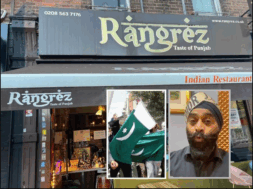
Manas Dasgupta
NEW DELHI, Aug 6: India is extremely concerned over the safety and security of over 19,000 Indian nationals, including about 9,000 students, in the violence-torn Bangladesh and is constantly in touch with the current authorities in the south Asian country, the external affairs minister S Jaishankar told the Rajya Sabha on Tuesday.
Making a statement in the upper house on the situation in Bangladesh, Mr Jaishankar, however, pointed out that nearly 8,000 odd Indian students in Bangladesh have returned to India in July when the violence first erupted and were yet to go back to that country, but the safety of the remaining Indian nationals there, most of them belonging to the minority community in the Muslim-majority nation remained a concern for the government.
He said India received request for permission for the arrival in the country of the Bangladesh deposed prime minister Sheikh Hasina “at very short notice” following her forced resignation as the violence escalated in that country.
While expressing hope for an early resolution to the political instability in the neighbouring country, Mr Jaishankar said India remained concerned about the status of minorities until law and order was restored. Concern about recent violence and instability in Bangladesh was shared by the political spectrum in India, he added.
Giving background of the violence, the minister said despite a decision of the Bangladesh Supreme Court decision cutting down the reservation quota for which the agitation initially started, there was no let-up in the months-long public agitation, and “the agitation at this stage coalesced around a one point agenda i.e. that the Prime Minister Sheikh Hasina should step down.”
“Our understanding is that after a meeting with the leaders of the security establishment, PM Hasina apparently made the decision to resign. At very short notice she requested approval to come for the moment to India. We simultaneously received a request for flight clearance from Bangladesh authorities. She arrived yesterday evening in Delhi.”
While recalling the “exceptionally close relations” between the two countries for many decades over many governments, he laid out a chronology of the situation in Bangladesh so far. Mr Jaishankar said there had been “considerable tension, deep divides and growing polarisation in Bangladesh politics,” since its General elections in January 2024. He continued that this aggravated a student agitation that began in June.
Through this period of violence, Mr Jaishankar said, the Indian government repeatedly counselled restraint and urged that the situation be defused through dialogue. While describing how the situation in Bangladesh unfolded, which he said took a serious turn on August 4, the Minister noted that what was particularly worrying was minorities, their businesses and temples coming under attack at multiple locations. Though he added that the full extent of this was still unclear.
“On August 5 demonstrators converged in Dhaka despite a curfew. Our understanding is that after a meeting with leaders of the security establishment Prime Minister Sheikh Hasina made the decision to resign. At very short notice she requested approval to come, for the moment, to India. We simultaneously received a request for flight clearance… she arrived yesterday evening in Delhi.”
He also referred to an address by Bangladesh Army chief General Waqar-uz-Zaman – made Monday evening, shortly after Mrs Hasina stepped down – in which he said, “I have met opposition leaders… we have decided to form an interim government…” and appealed for the violent protests to end.
“In the last 24 hours we have also been in regular touch with authorities in Dhaka. I seek the understanding and support of the House in regard to sensitive issues regarding an important neighbour on which there has always been strong national consensus,” he said.
Mr Jaishankar also spoke about India’s diplomatic missions in Chittagong, Rajshahi, Khulna and Sylhet, and said, “It is our expectation the host government will provide required security…” On the question of minorities (over 90 per cent of Bangladeshis are Muslims), he said, “We are monitoring the situation with regard to minorities. There are reports of initiatives to ensure their protection. We welcome that… but will remain deeply concerned till law and order is visibly restored.”
The situation in Bangladesh was still evolving, he said, adding that the Indian government was in close and continuous communication with the Indian community in Bangladesh. “There are various reports of initiatives by various groups and organisations to ensure their protection and well-being. We welcome that, but will naturally remain deeply concerned till law and order is visibly restored.”
Earlier in the day, Mr Jaishankar informed an all-party meeting that India has assured help to Ms Hasina and said he sought “the understanding and support of the House” on this issue.
Ms Hasina was forced to resign and flee from Dhaka after weeks of protests against a quota system for government jobs descended into violence and grew into a broader challenge to her 15-year rule. Thousands of demonstrators stormed her official residence and other buildings associated with her party and family.
Her departure threatened to create even more instability in the densely populated South Asian nation that is already dealing with a series of crises, from high unemployment to corruption to climate change. Amid security concerns, the main airport in Dhaka, the capital, suspended operations.
The officials of the external affairs ministry are still tight-lipped if Sheikh Hasina has requested for political asylum in India and what was the Indian government’s thinking on that line. On Monday evening, the Prime Minister Narendra Modi had chaired a meeting of the Cabinet Committee on Security (CCS) attended by Mr Jaishankar, Defence Minister Rajnath Singh, Home Minister Amit Shah, and Finance Minister Nirmala Sitharaman after the External Affairs Minister briefed the Prime Minister about the situation in Bangladesh.
Bangladesh is now set to have an interim government. The country’s Army Chief Gen. Waqar-Uz-Zaman said he would talk to the President to form the interim government and had held talks with the main Opposition parties and civil society members.
The events in Bangladesh present a problem for India, particularly if the UK turns down Sheikh Hasina’s asylum request. India also does not want to be seen as overtly backing the ousted leader because that may complicate the country’s relationship with the new government in Bangladesh, whatever it may be.
New Delhi is keeping a wary eye on Bangladesh after the fall of Sheikh Hasina, who pursued a delicate balancing act of enjoying support from India while maintaining strong relations with China.
India’s northeast states share a 4,096-km border with Bangladesh. Infiltration concerns prompted a 12-hour night curfew in Meghalaya, as well as putting Border Security Forces on high alert. Ms Hasina, 76, is in an undisclosed location in India after fleeing Dhaka – shortly before protesters overran and looted her residence. She has reportedly applied for asylum in the United Kingdom.
Meanwhile, the Union Home Minister Amit Shah held a meeting with foreign minister S Jaishankar and National Security Advisor Ajit Doval on Tuesday to discuss the security situation in the country. The situation in border areas has been delicate in view of the ongoing violence in the neighbouring country. While the authorities have kept an eye on illegal migration, there is also concern about the condition of the Indians living in Bangladesh and the minorities of the Muslim-majority nation.














